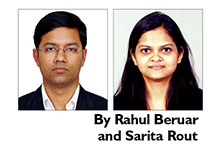 The Indian trademarks law recognises both statutory as well as common law remedy to protect the rights of the proprietor of a trade mark. However, it is well-known that registration of trade mark has always been emphasised upon on account of the fundamental principle that “registration is prima facie evidence of validity and facilitates proof of title by a plaintiff suing for infringement of his/her trade marks” [National Bell Company v. Metal Goods Manufacturing Company private Limited, AIR 1971 SC 898]. While the presumption of validity of a registered trade mark has been widely deemed absolute and relied upon in several infringement proceedings, especially at the stage of interim injunction, there have also been judgments wherein the courts in infringement proceedings have deviated from the said presumption and delved into ascertaining the validly of registration at the interlocutory stage itself. It is on account of these conflicting judgments that a reference was made to a full bench of the Bombay High Court to clarify whether a court of law could examine the validity of registration of the plaintiff’s trade mark at the stage of deciding an application for interim injunction. A full bench of Bombay High Court, while deciding the reference in “Lupin Ltd. v. Johnson and Johnson (Notice of Motion (L) No. 2178 of 2012 in Suit (L) No. 1842 of 2012) along with Shakti Bhog Foods Limited v. Parle Products Private Limited (Appeal (L) No. 674 of 2012)”, has held that while there exists a very strong presumption in law as to the validity of the registration of the trade mark, the courts are not powerless to refuse to grant an interlocutory injunction based on a plaintiff’s registered trade mark in exceptional circumstances when the registration of trade mark itself is ex facie illegal, fraudulent or shocks the conscience of the court. Therefore, a court can delve into the question of validity of registration of plaintiff’s trade mark for this limited purpose to arrive at a prima facie finding when the defendant raises the plea of invalidity of registration at the interim stage. However, the Bombay High Court also emphasised and cautioned that such discretion can be exercised by the court only upon a very high threshold of prima facie proof being submitted before the court establishing the ex facie illegality or fraud involved in securing the registration from the Trade Marks Registry. In concluding so, the Bombay High Court looked at the legislative intent behind the phrases “if valid” in Section 28 (which provides that registration if valid shall entitle proprietor of a registered trade mark to exclusive use of the same and obtain relief in case of infringement) and “prima facie evidence” in Section 31 of the Trade Marks Act, 1999 (which provides that registration is to be prima facie evidence of validity). It observed that these phrases have been explicitly provided to indicate that the presumption of validity is a rebuttable one and the defendant in an action for infringement may question the validity of plaintiff’s trade mark registration. One of the instances of registration which may be deemed to be ex facie illegal or fraud would be grant of registration to the word ‘glucose’, which was held by the Apex Court in Corn Products Refining Co. v. Shangrila Food Products Ltd, AIR 1960 SC 142 to be a publici juris word over which no individual can assert exclusive rights. The Bombay High Court further observed that the object of granting registration under the law, i.e. obviating the necessity of proving title to the mark in each and every case, is still achieved by the very creation of a strong presumption in law as to the validity of trade mark registration and placing a burden on the defendant to rebut the strong presumption of validity at the interlocutory stage. Furthermore, the jurisdiction to give a final and conclusive finding as to the validity of registration still remains intact with the IPAB through appropriate rectification proceedings instituted by the party challenging the registration. The court, having made only a prima facie finding with regard to the validity at the interlocutory stage, would still be bound by the conclusive finding of the IPAB in the rectification proceedings, if any. |
Clasis Law
Dr Gopal Das Bhawan
14th Floor, 28, Barakhamba Road
New Delhi 110 001, INDIA
Tel: (91) 11 4213 0000
Fax: (91) 11 4213 0099
Email: rahul.beruar@clasislaw.com
sarita.rout@clasislaw.com
Website: www.clasislaw.com

